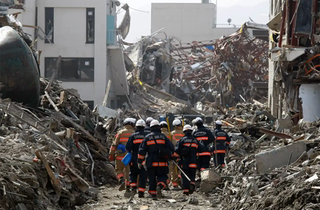The Japan Meteorological Agency confirmed the quakes off the Ishikawa coast, prompting the country to issue tsunami alerts and instructing residents to evacuate coastal areas.
Japanese Prime Minister Fumio Kishida addressed the nation in a televised statement, urging citizens to closely follow evacuation orders. He warned of the potential for more powerful earthquakes and tsunami waves in the aftermath of the initial shocks.
Both North and South Korea, along with Russia, have issued tsunami warnings in response to the seismic activity. South Korea's meteorological agency reported an initial tsunami of 67 cm, cautioning that it could increase in size over the next 24 hours. North Korea issued warnings for coastal areas, anticipating waves exceeding 2 meters, according to South Korea's Yonhap news agency. Russian officials, cited by TASS, indicated threats of a tsunami to parts of Sakhalin Island and mainland regions close to Japan.
The Japan Meteorological Agency has advised immediate evacuation for people in coastal and riverside areas under tsunami warnings. Coastal roads have been closed, and bullet trains in the affected region have been suspended, as reported by local media outlets.
While significant damage has been reported, especially in the destruction of buildings and power outages, Japan's Chief Cabinet Secretary Hayashi Yoshimasa provided assurance that no damage has been reported to nuclear power stations. This statement alleviates concerns of a recurrence of the 2011 Fukushima nuclear disaster.
The situation remains dynamic, and authorities continue to monitor developments closely, emphasizing the importance of adhering to safety instructions to mitigate further risks. (ILKHA)



 Dünya
Dünya
 Güncel
Güncel
 Güncel
Güncel
 Güncel
Güncel
 Dünya
Dünya
 Güncel
Güncel
 Güncel
Güncel
 Dünya
Dünya
 Güncel
Güncel
 Dünya
Dünya





